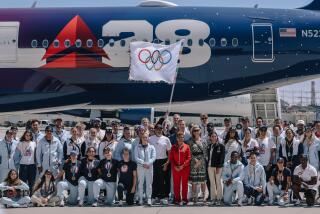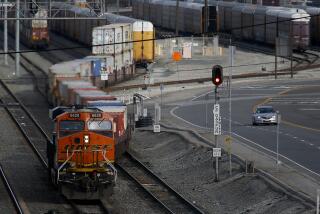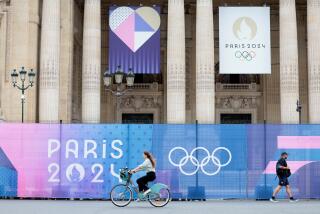Clearing the air for Olympics
- Share via
BEIJING — After weeks of thick, choking smog, the weather in the Chinese capital turned rainy this week, beginning with drizzle and building to a crescendo of violent thunderstorms spiked with hail.
And then, a near miracle: Just in time for the grand ceremonies in Tiananmen Square previewing next summer’s Olympic Games, the sun broke out, the smog was gone, and the sky was a color rarely seen here. Blue.
People began to wonder: Was the government messing with the weather?
Such a question might seem odd in some places, but this is China, where the communist government has made it clear that it will use all means at its disposal, including cloud-seeding, to ensure that Beijing’s notoriously foul air doesn’t spoil the 2008 Olympics. No one would be surprised if the government had tried a little test run while members of the International Olympic Committee were here to help celebrate the one-year run-up to the Games.
“Were the weather gods smiling on the Olympic host city, or was it a technological marvel?” the official China Daily newspaper puzzled on its front page Thursday.
Even a newspaper run by the state couldn’t get an answer. “There was no official comment on whether weather manipulation was the reason for yesterday’s sunny day,” the paper said.
It hardly matters. The larger point is that Beijing is ready to move heaven and Earth to clean up some of the world’s worst air pollution in time for the Games -- yet Olympic officials remain worried that whatever the hosts do, it won’t be enough.
IOC President Jacques Rogge seemed to shock Chinese officials this week by saying that on days when the air is especially bad, some outdoor Olympic events might have to be postponed.
Although Rogge was full of praise for the Chinese organizers, who are on target to finish all of the venues for the Games, he said: “My concerns, which I believe are the concerns of everyone, are the climate and the environment, and especially the air environment.”
Not a new concern
Air pollution has certainly been a concern at previous Games. Olympics tend to be held in large cities, where smog goes with the territory. Air quality was a worry in Los Angeles in 1984, Seoul in 1988 and Athens in 2004. In each case, the cities managed to clean up for the Games. In Los Angeles, for instance, organizers largely used persuasion to temporarily shut down factories and keep drivers off the freeways.
But in Beijing, the problem is on a whole new scale.
It is hard to adequately describe how awful Beijing’s air can be. There are days when buildings across a large street can slip away into the haze. People often wear surgical masks outdoors, despite warnings that they don’t actually do much to filter the most harmful forms of pollution.
The Chinese measure smog on a scale from zero to 500. A reading of 300 is beyond anything generally seen in the United States, said Alex Wang, an attorney with the Beijing office of the Natural Resources Defense Council. One day last year, he said, the pollution scale for Beijing hit 500, “which is like the mercury breaking through the thermometer.” Because the scale doesn’t go any higher, nobody knows what the true reading would have been, Wang said.
The plans for cleaning the air are impressive. The city has moved or closed 200 of its most noxious factories and power plants. One of the biggest polluters, a massive steel plant run by the Beijing Capital Iron & Steel Group, is being moved more than 100 miles east. Five major coal-fired power plants are being upgraded to reduce emissions, and Beijing’s first wind-power station is being built.
In addition, the city subway system is being roughly doubled in size and capacity, with four new lines expected to open in time for the Olympics; planners hope that will take cars off the streets.
The city is upgrading its vehicle emission standards and computerizing traffic lights, also with the aim of reducing pollution. Fifty thousand old taxis have been taken off the streets and replaced with newer, more-efficient models. The city has added 4,000 buses that run on natural gas, and -- one more bit of eye-popping math -- officials say they planted nearly 28 million trees last year.
“Our efforts are paying off,” said Sun Weide, a spokesman for the Beijing Olympic Organizing Committee. “Air quality has been improved from 100 good air-quality days in 1998 to 241 days in 2006.”
Other plans
On top of all that, Beijing is planning a number of temporary measures, including a halt in construction, temporary closures of factories and a plan to keep a large percentage of the city’s cars off the roads during the Games. Last fall, Beijing experimented by getting 800,000 cars, about one-third of the total, off the roads during a weeklong summit with African leaders. A study based on NASA satellite data concluded that the effort cut nitrogen oxide emissions by 40%.
The city announced plans Thursday for a new test Aug. 17-20 in which about 1.3 million vehicles, close to half of the city’s total, will be ordered off the road. The system will be based on odd and even license plate numbers, state media said.
And, of course, there’s the cloud-seeding. The idea is that rain can wash away pollution, and also that by controlling the timing of rainstorms, Olympic organizers can avoid disruptions to outdoor sports.
Despite that, Olympic officials are wary, and some teams have reportedly made plans to stay away from Beijing until the last possible moment in order to minimize the time that their athletes have to breathe the city’s air.
Officially, the International Olympic Committee has declared its confidence in Beijing’s ability to wrestle with the problem, although it expresses that confidence with a tinge of something close to buyer’s remorse.
“Few predicted back in 2001, when Beijing was elected as hosts for the 2008 Games, the degree to which economic growth in China would create challenges regarding the environment,” IOC spokeswoman Giselle Davies said in an e-mail. “Now, in 2007, it is clear that this is a factor that needs addressing -- and, indeed, no one knows this more acutely than our Chinese hosts. The IOC is confident that the challenge will be successfully tackled and dealt with.”
Out on the far western edges of Beijing, where Capital Iron & Steel has smudged the sky with its smokestacks for more than half a century, residents have learned to live with scratchy throats and dust-darkened clothes. Although the plant’s relocation means that many workers will have to move or commute, people seem happy that the Olympics gave the city an excuse to get rid of a major polluter.
“It’s a good thing,” said Wang Youfu, 78, who retired from the steel plant 17 years ago but still lives in worker housing nearby. Actually, he said, the plant has been getting cleaner for the last decade. Gone are the days when it would emit “red smoke” all night, he said. Once, he said, the plant released some kind of gas “and a couple of people choked to death from it.”
At his age, Wang said, he doesn’t have much use for the Olympics. But he’s glad they’re coming to Beijing, and he’s glad the steel plant is moving. Does he believe the government will manage to clean up the air by next August?
“Yeah,” he said, puffing on a pipe. “I think so, since the government said so.”
mitchell.landsberg@latimes.com
Gu Bo of The Times’ Beijing Bureau contributed to this report.
More to Read
Go beyond the scoreboard
Get the latest on L.A.'s teams in the daily Sports Report newsletter.
You may occasionally receive promotional content from the Los Angeles Times.






